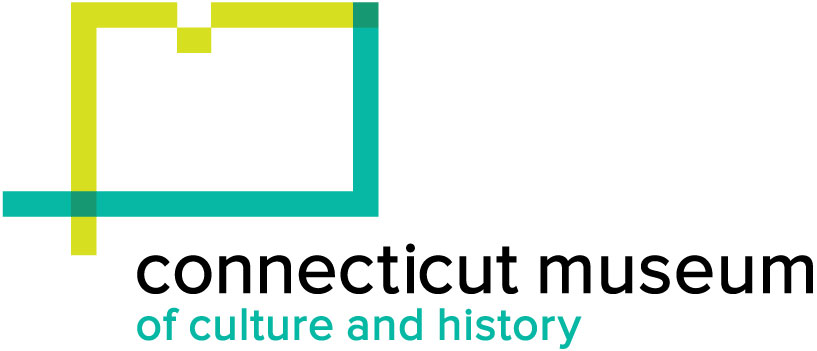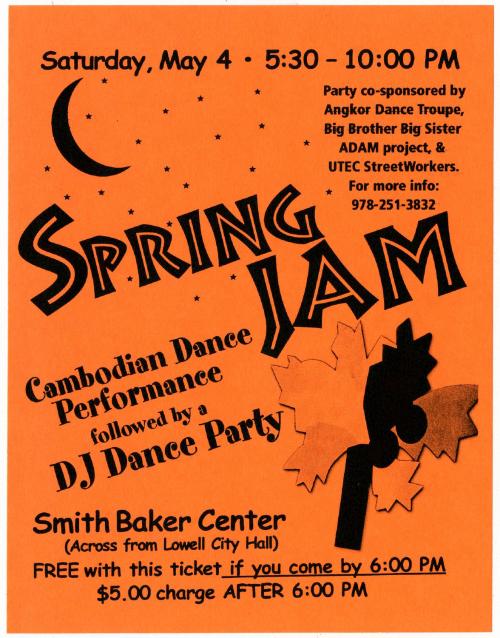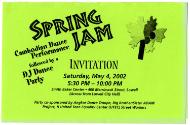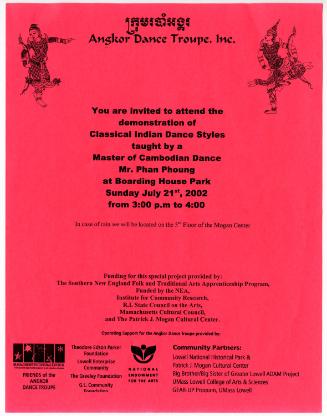Flyers: Spring Jam, Cambodian Dance Party
DistributorDistributed by
Angkor Dance Troupe
Date2002
MediumPaper
ClassificationsInformation Artifacts
Credit LineConnecticut Cultural Heritage Arts Program collections
CopyrightIn Copyright
Object number2015.196.12.4a-c
Description(a-b) Two flyers and (c) invitation for Spring Jam, Cambodian Dance Party, May 4, 2002.
These flyers relate to participants in the Southern New England Apprenticeship Program Years 3 and 4 team in Cambodian dance with teaching artist Phan Phoung and apprentices from the Angkor Dance Troupe. Flyer (c) mentions the Southern New England Traditional Arts Program.
NotesSubject Note: The Southern New England Traditional Arts Apprenticeship Program is a CCHAP initiative since 1997 that fosters the sharing of community-based traditional (folk) artistic skills through the apprenticeship learning model of regular, intensive, one-on-one teaching by a skilled mentor artist to a student/apprentice. The program pairs master artists from Rhode Island, Massachusetts, or Connecticut with apprentices from one of the other states, as a way to knit together members of the same community or group across state lines. Teaching and learning traditional arts help to sustain cultural expressions that are central to a community, while also strengthening festivals, arts activities, and events when master/apprentice artists perform or demonstrate results of their cooperative learning to public audiences. The Connecticut Cultural Heritage Arts Program at the Connecticut Historical Society manages the program in collaboration with the Folk Arts Program at the Massachusetts Cultural Council and independent folklorist Winifred Lambrecht who has a deep knowledge of the folk arts landscape of Rhode Island. Primary funding for the program comes from the National Endowment for the Arts, with support also from the Connecticut Commission on the Arts, the Institute for Community Research, and the Connecticut Historical Society.These flyers relate to participants in the Southern New England Apprenticeship Program Years 3 and 4 team in Cambodian dance with teaching artist Phan Phoung and apprentices from the Angkor Dance Troupe. Flyer (c) mentions the Southern New England Traditional Arts Program.
Subject Note: In Years 3 and 4 of the Southern New England Traditional Arts Apprenticeship Program, teaching artist Phan Phoung (Bethel, CT) worked with apprentices Tim Chan Thou, Sophy Leng, and Peter Veth of the Angkor Dance Troupe (Lowell, MA). As a young man Phan Phoung spent many years in exile in India where he learned the elements of traditional dance there. After his return to Cambodia he was the primary dance ethnologist to record and learn the folk dances remaining after the time of the Khmer Rouge. In America he presented the folk dances of Cambodia in performance and worked as mentor to the Angkor Dance Troupe. Under this apprenticeship he taught two young dancers and the troupe’s folk dance instructor aspects of an Indian traditional dance called Kuchi Pudi which includes basic hand and foot gestures and facial expressions fundamental to both Indian and Cambodian choreography.
Biographical Note: Phan Phoung is a Cambodian dancer, choreographer, and drummer who studied the fundamentals of Cambodian classical dance in India in the 1960s. While he lived there to pursue his studies, Cambodia was taken over by the Khmer Rouge regime, and he could not return. He immigrated to the United States where he worked and raised a family. Phan Phoung also worked with the Angkor Dance Troupe in Lowell, Massachusetts, teaching classical movement. He and apprentices from the troupe participated in Years 3 and 4 of the Southern New England Traditional Arts Apprenticeship Program, performing their required public presentation at the Inside/Out festival (outdoor stage) at Jacobs Pillow, and at Boarding House Park during the Lowell Folk Festival. Phan Phoung has taught Cambodian dance to the White Elephant Dance Group in central Connecticut, and lives and collaborates with renowned Cambodian dancers and musicians in Virginia where he is part of the organization Cambodian American Heritage.
Additional materials exist in the CCHAP archive.
Cataloging Note: This project was made possible in part by the Institute of Museum and Library Services MA-245929-OMS-20.
Status
Not on view2002-2010
John Monteiro
2005 June 19

















